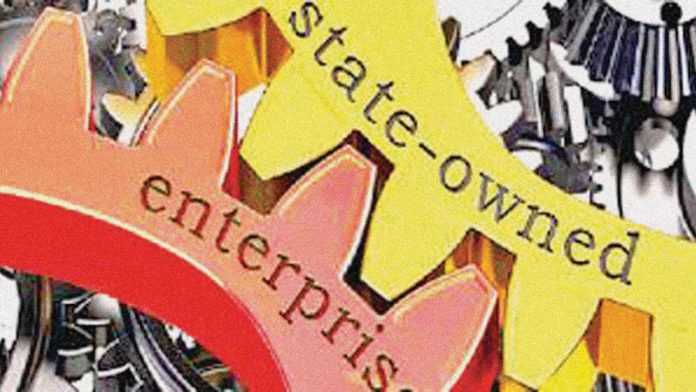State-Owned Enterprises (SOEs) play a significant role in Sri Lanka’s economy through strategically essential sectors such as energy, water, shipping and ports, banking, insurance, transportation, aviation, and construction. Nevertheless, the reality and the common belief are that mismanagement, fraud, misappropriation, corruption, and negligence that prevailed in most of these SOEs have cost the country dearly, wasting a colossal amount of public money that may run into trillions of rupees over the past few decades.
https://googleads.g.doubleclick.net/pagead/ads?gdpr=0&client=ca-pub-8050455532790881&output=html&h=280&adk=995279986&adf=2340046855&w=780&abgtt=6&fwrn=4&fwrnh=100&lmt=1715783796&num_ads=1&rafmt=1&armr=3&sem=mc&pwprc=4823332321&ad_type=text_image&format=780×280&url=https%3A%2F%2Fwww.sundayobserver.lk%2F2024%2F05%2F12%2Fnews-features%2F23013%2Fthe-risks-of-delay-in-reforming-state-owned-enterprises%2F&fwr=0&pra=3&rh=195&rw=779&rpe=1&resp_fmts=3&wgl=1&fa=27&uach=WyJXaW5kb3dzIiwiMTAuMC4wIiwieDg2IiwiIiwiMTI0LjAuNjM2Ny4yMDEiLG51bGwsMCxudWxsLCI2NCIsW1siQ2hyb21pdW0iLCIxMjQuMC42MzY3LjIwMSJdLFsiR29vZ2xlIENocm9tZSIsIjEyNC4wLjYzNjcuMjAxIl0sWyJOb3QtQS5CcmFuZCIsIjk5LjAuMC4wIl1dLDBd&dt=1715783795846&bpp=1&bdt=1055&idt=-M&shv=r20240513&mjsv=m202405130101&ptt=9&saldr=aa&abxe=1&cookie=ID%3D31cc624740e023c1%3AT%3D1715781429%3ART%3D1715783529%3AS%3DALNI_MbS-an1PbCogTN7OcnIs66qoGbuzA&gpic=UID%3D00000e1e518bcc4e%3AT%3D1715781429%3ART%3D1715783529%3AS%3DALNI_Mbr3nxfYaM5TOo9FIU2o5ARB6Tdhg&eo_id_str=ID%3Dc3cc4a6e54d0c392%3AT%3D1715781429%3ART%3D1715783529%3AS%3DAA-AfjbhPisY-4xn0X8pOc5tsw8m&prev_fmts=0x0%2C1200x280&nras=3&correlator=2323497970509&frm=20&pv=1&ga_vid=239061156.1715781430&ga_sid=1715783795&ga_hid=1699767891&ga_fc=1&u_tz=330&u_his=12&u_h=864&u_w=1536&u_ah=824&u_aw=1536&u_cd=24&u_sd=1.25&dmc=8&adx=175&ady=1411&biw=1519&bih=703&scr_x=0&scr_y=0&eid=44759875%2C44759926%2C44759837%2C31083359%2C44795922%2C95331982%2C31083611%2C95330888%2C95331711%2C95332415%2C31078663%2C31078665%2C31078668%2C31078670&oid=2&pvsid=144125521292923&tmod=1457015987&uas=0&nvt=1&ref=https%3A%2F%2Fwww.sundayobserver.lk%2Fcategory%2Fnews-features%2F&fc=1408&brdim=0%2C0%2C0%2C0%2C1536%2C0%2C1536%2C824%2C1536%2C703&vis=1&rsz=%7C%7Cs%7C&abl=NS&fu=128&bc=31&bz=1&td=1&psd=W251bGwsbnVsbCwibGFiZWxfb25seV81IiwxXQ..&nt=1&ifi=3&uci=a!3&btvi=1&fsb=1&dtd=229
In order to mitigate the ongoing severe economic crisis, repayment of the staggering foreign debt pile, and fiscal consolidation, the imperative need for reforming the country’s SOEs has made headlines in Sri Lankan society. Although reforming loss-making SOEs is a dire necessity in the context of the current crisis, its implementation may be a daunting task for the government due to the potential heavy resistance of trade unionists and dubious politicians.
How many SOEs exist in Sri Lanka today? Regrettably, the answer to this pertinent question, even though the question looks elementary, is unclear and utterly confusing. This writer’s attempt to find out the exact number of operating SOEs through various state institutions was futile, as no accurate record exists in any of the records of those entities.
However, the closest answer came from the Advocata Institute, an independent policy think tank, where they indicated that there are 527 SOEs in Sri Lanka. According to the same source, the accumulated loss of SOEs from 2006 to 2021 has run into a staggering 1.5 trillion rupees.
Needless to say, the public has lost faith in many SOEs in the country due to numerous reasons. Over the years, instead, most of these institutions were dumping grounds for politicians who provided employment unreasoningly to achieve their political ambitions. Time and again, the media reveal, with credible examples, that some of the SOEs have even been established to facilitate political desires that have led to corruption.
The control, administration, and monitoring are thoroughly inadequate to deal with most of the issues in these SOEs. It was reported that out of 500+ SOEs that employ 10% (1.9 million) of the total workforce of the public sector, the financial data of the vast majority of such institutions is not available to the public, which reveals the gross inefficiency of management as well as the negligence of governance.
https://googleads.g.doubleclick.net/pagead/ads?gdpr=0&client=ca-pub-8050455532790881&output=html&h=280&adk=995279986&adf=1557435791&w=780&abgtt=6&fwrn=4&fwrnh=100&lmt=1715783796&num_ads=1&rafmt=1&armr=3&sem=mc&pwprc=4823332321&ad_type=text_image&format=780×280&url=https%3A%2F%2Fwww.sundayobserver.lk%2F2024%2F05%2F12%2Fnews-features%2F23013%2Fthe-risks-of-delay-in-reforming-state-owned-enterprises%2F&fwr=0&pra=3&rh=195&rw=779&rpe=1&resp_fmts=3&wgl=1&fa=27&uach=WyJXaW5kb3dzIiwiMTAuMC4wIiwieDg2IiwiIiwiMTI0LjAuNjM2Ny4yMDEiLG51bGwsMCxudWxsLCI2NCIsW1siQ2hyb21pdW0iLCIxMjQuMC42MzY3LjIwMSJdLFsiR29vZ2xlIENocm9tZSIsIjEyNC4wLjYzNjcuMjAxIl0sWyJOb3QtQS5CcmFuZCIsIjk5LjAuMC4wIl1dLDBd&dt=1715783795846&bpp=1&bdt=1055&idt=-M&shv=r20240513&mjsv=m202405130101&ptt=9&saldr=aa&abxe=1&cookie=ID%3D31cc624740e023c1%3AT%3D1715781429%3ART%3D1715783529%3AS%3DALNI_MbS-an1PbCogTN7OcnIs66qoGbuzA&gpic=UID%3D00000e1e518bcc4e%3AT%3D1715781429%3ART%3D1715783529%3AS%3DALNI_Mbr3nxfYaM5TOo9FIU2o5ARB6Tdhg&eo_id_str=ID%3Dc3cc4a6e54d0c392%3AT%3D1715781429%3ART%3D1715783529%3AS%3DAA-AfjbhPisY-4xn0X8pOc5tsw8m&prev_fmts=0x0%2C1200x280%2C780x280&nras=4&correlator=2323497970509&frm=20&pv=1&ga_vid=239061156.1715781430&ga_sid=1715783795&ga_hid=1699767891&ga_fc=1&u_tz=330&u_his=12&u_h=864&u_w=1536&u_ah=824&u_aw=1536&u_cd=24&u_sd=1.25&dmc=8&adx=175&ady=2352&biw=1519&bih=703&scr_x=0&scr_y=0&eid=44759875%2C44759926%2C44759837%2C31083359%2C44795922%2C95331982%2C31083611%2C95330888%2C95331711%2C95332415%2C31078663%2C31078665%2C31078668%2C31078670&oid=2&pvsid=144125521292923&tmod=1457015987&uas=0&nvt=1&ref=https%3A%2F%2Fwww.sundayobserver.lk%2Fcategory%2Fnews-features%2F&fc=1408&brdim=0%2C0%2C0%2C0%2C1536%2C0%2C1536%2C824%2C1536%2C703&vis=1&rsz=%7C%7Cs%7C&abl=NS&fu=128&bc=31&bz=1&td=1&psd=W251bGwsbnVsbCwibGFiZWxfb25seV81IiwxXQ..&nt=1&ifi=4&uci=a!4&btvi=2&fsb=1&dtd=243
The staff is not motivated enough in most of these institutions to perform efficiently and invariably go easy on their duties, disregarding public services, as they receive salaries and other perks irrespective of national economic burdens. In essence, as there is no information available, the public is not aware of the extent of financial damage SOEs can cause through inefficiencies and failures.
At this crucial juncture, where the country has reached its climax in financial burden, reforming every loss-making state-owned entity is not a requirement anymore but an absolute necessity and a matter of national importance. The state coffers provide the comfort of funds to run these institutions, whose performance is never monitored.
It is clearly stated that the IMF also not take up delays in the restructuring process of SOEs favourably, as they have also highlighted the importance of reforms. However, as the country is entering the election cycle and making the move to pass necessary legislative framework amendments, delays may occur despite the dire necessity.
At this point, the economic situation of the country is showing clear signs of stabilisation and recovery, even at a snail’s pace. The authorities have thus far been stringent and contractionary on monetary and fiscal policy. According to sources, even the reserves have crossed the US$5 billion mark due to several positive steps taken by the government over the past months, relieving some of the pressing foreign currency shortage burdens that have prevailed since the inception of the current crisis.
https://googleads.g.doubleclick.net/pagead/ads?gdpr=0&client=ca-pub-8050455532790881&output=html&h=280&adk=995279986&adf=1370498537&w=780&abgtt=6&fwrn=4&fwrnh=100&lmt=1715783796&num_ads=1&rafmt=1&armr=3&sem=mc&pwprc=4823332321&ad_type=text_image&format=780×280&url=https%3A%2F%2Fwww.sundayobserver.lk%2F2024%2F05%2F12%2Fnews-features%2F23013%2Fthe-risks-of-delay-in-reforming-state-owned-enterprises%2F&fwr=0&pra=3&rh=195&rw=779&rpe=1&resp_fmts=3&wgl=1&fa=27&uach=WyJXaW5kb3dzIiwiMTAuMC4wIiwieDg2IiwiIiwiMTI0LjAuNjM2Ny4yMDEiLG51bGwsMCxudWxsLCI2NCIsW1siQ2hyb21pdW0iLCIxMjQuMC42MzY3LjIwMSJdLFsiR29vZ2xlIENocm9tZSIsIjEyNC4wLjYzNjcuMjAxIl0sWyJOb3QtQS5CcmFuZCIsIjk5LjAuMC4wIl1dLDBd&dt=1715783795834&bpp=1&bdt=1044&idt=1&shv=r20240513&mjsv=m202405130101&ptt=9&saldr=aa&abxe=1&cookie=ID%3D31cc624740e023c1%3AT%3D1715781429%3ART%3D1715783529%3AS%3DALNI_MbS-an1PbCogTN7OcnIs66qoGbuzA&gpic=UID%3D00000e1e518bcc4e%3AT%3D1715781429%3ART%3D1715783529%3AS%3DALNI_Mbr3nxfYaM5TOo9FIU2o5ARB6Tdhg&eo_id_str=ID%3Dc3cc4a6e54d0c392%3AT%3D1715781429%3ART%3D1715783529%3AS%3DAA-AfjbhPisY-4xn0X8pOc5tsw8m&prev_fmts=0x0%2C1200x280%2C780x280%2C780x280%2C340x280&nras=6&correlator=2323497970509&frm=20&pv=1&ga_vid=239061156.1715781430&ga_sid=1715783795&ga_hid=1699767891&ga_fc=1&u_tz=330&u_his=12&u_h=864&u_w=1536&u_ah=824&u_aw=1536&u_cd=24&u_sd=1.25&dmc=8&adx=175&ady=3183&biw=1519&bih=703&scr_x=0&scr_y=380&eid=44759875%2C44759926%2C44759837%2C31083359%2C44795922%2C95331982%2C31083611%2C95330888%2C95331711%2C95332415%2C31078663%2C31078665%2C31078668%2C31078670&oid=2&pvsid=144125521292923&tmod=1457015987&uas=0&nvt=1&ref=https%3A%2F%2Fwww.sundayobserver.lk%2Fcategory%2Fnews-features%2F&fc=1408&brdim=0%2C0%2C0%2C0%2C1536%2C0%2C1536%2C824%2C1536%2C703&vis=1&rsz=%7C%7Cs%7C&abl=NS&fu=128&bc=31&bz=1&td=1&psd=W251bGwsbnVsbCwibGFiZWxfb25seV81IiwxXQ..&nt=1&ifi=5&uci=a!5&btvi=4&fsb=1&dtd=601
In this backdrop, the government seems to have taken somewhat tough decisions on reforming loss-making SOEs. They include the introduction of fresh pricing formulas for key institutions aimed at improving financial performance. For example, amid the severe resistance of trade unions and almost all opposition political parties who were vying for cheap publicity, the government successfully increased the electricity tariff to create a reasonable outcome for the Ceylon Electricity Board.
However, the historical behaviour of governments in the past has consistently indicated that the price structures of essential public amenities were reduced during election cycles. Thus, the pricing formulas may change, even temporarily, when already-lined-up national elections are called.
The irony is that those opposing political factions who resist or instigate their followers to contest hardline decisions on reforms do not seem to realise that they encourage corruption and waste further. Almost every leader of these political parties understands the necessity of reforms to stop the colossal waste of loss-making SOEs. Nevertheless, they attempt to sideline the real issue for political gain.
Regrettably, almost all of them disregard the grim reality and ignore both imminent and long-term negative consequences. Their sole intention is to impress their followers and grab as many votes as possible from other political parties. However, considering all angles, implementing strategies for restructuring SOEs would undoubtedly improve competition and efficiency in the provisioning of utilities. It will also enhance the efficient administration of such institutions and, more importantly, reduce the current enormous burden on government coffers.
https://googleads.g.doubleclick.net/pagead/ads?gdpr=0&client=ca-pub-8050455532790881&output=html&h=280&adk=995279986&adf=347048491&w=780&abgtt=6&fwrn=4&fwrnh=100&lmt=1715783796&num_ads=1&rafmt=1&armr=3&sem=mc&pwprc=4823332321&ad_type=text_image&format=780×280&url=https%3A%2F%2Fwww.sundayobserver.lk%2F2024%2F05%2F12%2Fnews-features%2F23013%2Fthe-risks-of-delay-in-reforming-state-owned-enterprises%2F&fwr=0&pra=3&rh=195&rw=779&rpe=1&resp_fmts=3&wgl=1&fa=27&uach=WyJXaW5kb3dzIiwiMTAuMC4wIiwieDg2IiwiIiwiMTI0LjAuNjM2Ny4yMDEiLG51bGwsMCxudWxsLCI2NCIsW1siQ2hyb21pdW0iLCIxMjQuMC42MzY3LjIwMSJdLFsiR29vZ2xlIENocm9tZSIsIjEyNC4wLjYzNjcuMjAxIl0sWyJOb3QtQS5CcmFuZCIsIjk5LjAuMC4wIl1dLDBd&dt=1715783795837&bpp=1&bdt=1046&idt=0&shv=r20240513&mjsv=m202405130101&ptt=9&saldr=aa&abxe=1&cookie=ID%3D31cc624740e023c1%3AT%3D1715781429%3ART%3D1715783529%3AS%3DALNI_MbS-an1PbCogTN7OcnIs66qoGbuzA&gpic=UID%3D00000e1e518bcc4e%3AT%3D1715781429%3ART%3D1715783529%3AS%3DALNI_Mbr3nxfYaM5TOo9FIU2o5ARB6Tdhg&eo_id_str=ID%3Dc3cc4a6e54d0c392%3AT%3D1715781429%3ART%3D1715783529%3AS%3DAA-AfjbhPisY-4xn0X8pOc5tsw8m&prev_fmts=0x0%2C1200x280%2C780x280%2C780x280%2C340x280%2C780x280&nras=7&correlator=2323497970509&frm=20&pv=1&ga_vid=239061156.1715781430&ga_sid=1715783795&ga_hid=1699767891&ga_fc=1&u_tz=330&u_his=12&u_h=864&u_w=1536&u_ah=824&u_aw=1536&u_cd=24&u_sd=1.25&dmc=8&adx=175&ady=3209&biw=1519&bih=703&scr_x=0&scr_y=536&eid=44759875%2C44759926%2C44759837%2C31083359%2C44795922%2C95331982%2C31083611%2C95330888%2C95331711%2C95332415%2C31078663%2C31078665%2C31078668%2C31078670&oid=2&pvsid=144125521292923&tmod=1457015987&uas=0&nvt=1&ref=https%3A%2F%2Fwww.sundayobserver.lk%2Fcategory%2Fnews-features%2F&fc=1408&brdim=0%2C0%2C0%2C0%2C1536%2C0%2C1536%2C824%2C1536%2C703&vis=1&rsz=%7C%7Cs%7C&abl=NS&fu=128&bc=31&bz=1&td=1&psd=W251bGwsbnVsbCwibGFiZWxfb25seV81IiwxXQ..&nt=1&ifi=6&uci=a!6&btvi=5&fsb=1&dtd=1089
The common public opinion is that the government needs to operate a few essential SOEs that provide essential services, at least at the breakeven point. However, they opine that the majority of other institutions engaged in commercial activities must be managed under private sector ownership.
The SOEs must be exposed to structural reforms to strengthen corporate governance and control the prevailing arbitrary administration and political manipulations. The goal must be to enhance transparency, accountability, and oversight mechanisms to eliminate political interference, improve decision-making, and ensure responsible and accountable guardianship of public assets.
Meanwhile, steps must be taken to implement meaningful measures to address the accumulated debt pile, streamline currently chaotic operational functions, cut costs to eliminate waste, and enhance revenue generation.
Sectoral reforms such as opening monopolistic sectors to competition, such as recently liberalised petroleum imports, must be encouraged to promote more engaged private sector participation. Consumers may benefit enormously from fostering efficiency in service delivery through private sector participation.
Reforming SOEs will also enhance the skills of the current seemingly sluggish workforce. Training in technological skills, particularly the use of information technology, will build capacity to suit the future needs of the country. At this point, knowledge and expertise are desperately needed to improve the performance of the public sector workforce.
https://googleads.g.doubleclick.net/pagead/ads?gdpr=0&client=ca-pub-8050455532790881&output=html&h=280&adk=995279986&adf=2669509082&w=780&abgtt=6&fwrn=4&fwrnh=100&lmt=1715783816&num_ads=1&rafmt=1&armr=3&sem=mc&pwprc=4823332321&ad_type=text_image&format=780×280&url=https%3A%2F%2Fwww.sundayobserver.lk%2F2024%2F05%2F12%2Fnews-features%2F23013%2Fthe-risks-of-delay-in-reforming-state-owned-enterprises%2F&fwr=0&pra=3&rh=195&rw=779&rpe=1&resp_fmts=3&wgl=1&fa=27&uach=WyJXaW5kb3dzIiwiMTAuMC4wIiwieDg2IiwiIiwiMTI0LjAuNjM2Ny4yMDEiLG51bGwsMCxudWxsLCI2NCIsW1siQ2hyb21pdW0iLCIxMjQuMC42MzY3LjIwMSJdLFsiR29vZ2xlIENocm9tZSIsIjEyNC4wLjYzNjcuMjAxIl0sWyJOb3QtQS5CcmFuZCIsIjk5LjAuMC4wIl1dLDBd&dt=1715783795839&bpp=1&bdt=1048&idt=0&shv=r20240513&mjsv=m202405130101&ptt=9&saldr=aa&abxe=1&cookie=ID%3D31cc624740e023c1%3AT%3D1715781429%3ART%3D1715783529%3AS%3DALNI_MbS-an1PbCogTN7OcnIs66qoGbuzA&gpic=UID%3D00000e1e518bcc4e%3AT%3D1715781429%3ART%3D1715783529%3AS%3DALNI_Mbr3nxfYaM5TOo9FIU2o5ARB6Tdhg&eo_id_str=ID%3Dc3cc4a6e54d0c392%3AT%3D1715781429%3ART%3D1715783529%3AS%3DAA-AfjbhPisY-4xn0X8pOc5tsw8m&prev_fmts=0x0%2C1200x280%2C780x280%2C780x280%2C340x280%2C780x280%2C780x280&nras=8&correlator=2323497970509&frm=20&pv=1&ga_vid=239061156.1715781430&ga_sid=1715783795&ga_hid=1699767891&ga_fc=1&u_tz=330&u_his=12&u_h=864&u_w=1536&u_ah=824&u_aw=1536&u_cd=24&u_sd=1.25&dmc=8&adx=175&ady=3784&biw=1519&bih=703&scr_x=0&scr_y=981&eid=44759875%2C44759926%2C44759837%2C31083359%2C44795922%2C95331982%2C31083611%2C95330888%2C95331711%2C95332415%2C31078663%2C31078665%2C31078668%2C31078670&oid=2&pvsid=144125521292923&tmod=1457015987&uas=1&nvt=1&ref=https%3A%2F%2Fwww.sundayobserver.lk%2Fcategory%2Fnews-features%2F&fc=1408&brdim=0%2C0%2C0%2C0%2C1536%2C0%2C1536%2C824%2C1536%2C703&vis=1&rsz=%7C%7Cs%7C&abl=NS&fu=128&bc=31&bz=1&td=1&psd=W251bGwsbnVsbCwibGFiZWxfb25seV81IiwxXQ..&nt=1&ifi=7&uci=a!7&btvi=6&fsb=1&dtd=20558
Also, building institutional capacity, enhancing regulatory enforcement, and promoting a culture of transparency, integrity, and strong leadership within the SOEs must be introduced without being manipulated by politicians.
Delaying reforms in Sri Lanka’s SOEs poses significant risks to economic stability, growth, and social welfare. The losses made, which have run into trillions of rupees, have created an enormous challenge to the country’s progress. Therefore, strong and bold policy decisions must be made without heeding political hypocrisy and without any further delay.
Delaying SOE reforms will further aggravate the already grave economic crisis. The more the incumbent government, or the governments to come, distance itself from the reforms due to any reason, political or otherwise, the more it the more it will trigger irreparable damage to the country.
Therefore, addressing the structural challenges facing SOEs requires bold policy measures, institutional reforms, and strategic interventions to enhance governance, efficiency, and sustainability. By prioritising SOE reforms and fostering a conducive environment for private sector participation and innovation, Sri Lanka can unlock the potential of its economy, promote inclusive growth, and build a prosperous future for its citizens.



